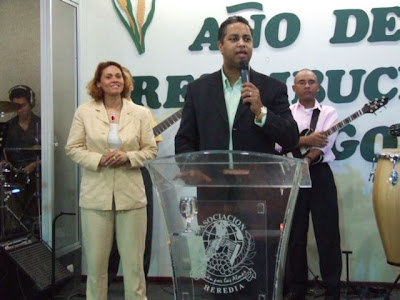Raising up an Apostolic and Prophetic Generation
“I was given instructions that I assume was one of the primary reasons for the encounter. It was the guidance to pray for the rising up of a new generation of leaders—prophets of the apostolic mould. Leaders who could once again gather the people of God into communities of radical faithfulness.”
–Richard Foster, Prayer
In 1978, as Richard Foster was praying and strolling across a beach in Portland , Oregon
This is a very personal story because it has to do with what I consider my life’s purpose and calling. As an 18 year old, I wrote my life’s purpose down which I have distilled to the following words: “To raise up a new generation that will make known the love, the life, the power, and the voice of God to their world.”
It is at this point that I want to introduce two concepts that are important to me as well as to the movement which I belong to: the International Pentecostal Holiness Church (IPHC). In January 2010, the late Bishop Ron Carpenter, Sr. made a proclamation via his monthly webcast that our church is an Apostolic Prophetic Church
Nine years ago, I began my career as a “missionary” to Amsterdam , the Netherlands
Jesus came to seek and to save that which was lost. Jesus was a friend to the drunkards, the tax collectors and the prostitutes. Jesus healed the sick, raised the dead, cleansed the lepers and did all that he saw and heard his Father telling him to do (John 5:19). Jesus built and still is building his church today (Matthew 16:18). Jesus power came out of his intimate relationship with his father. His identity was based on the words said at his baptism, “This is my beloved son in him I am well pleased” (Matthew 3:17). Hearing the voice of Father God and sharing it with others is a simple definition of being prophetic. The followers of Jesus did the same works he did 2,000 years ago and they are still doing them today.
My brother, Aaron, an IPHC missionary (apostle) to Fortaleza , Brazil
In Europe, at this time, we are not experiencing the large amounts of miracles or baptisms taking place as in Brazil Netherlands
Last week I took a young man on the street to do evangelism. He stopped the first person he saw and asked them if he knew Jesus loved them. That person ran away as quickly as he could from us. I then told my friend to try another strategy. We went to a park where three young guys were skating. I asked them if I could give them a spiritual gift such as healing or an encouraging word. They were amazed as they watched how Jesus healed them of their different pains (back, foot, and ankle). I shared my testimony of being healed of Cerebral Palsy and how Jesus loved them and they were so happy and thankful they wanted to take our picture to remember us. Again, the goal of being apostolic or prophetic is not to gain a new title, but to show people the love of Jesus in a very tangible and personal way.
Another great example of a modern day apostle was a man named John Chapman, otherwise known as Jonny Appleseed. Chapman was a missionary who planted not only the gospel, but also apple trees in large parts of Pennsylvania , Ohio , Indiana , Illinois and West Virginia
In Amsterdam Amsterdam
However, one of the most important characteristic of an apostolic and prophetic church is radical, selfless and sacrificial love. Two men were once travelling in a snowy cold mountain late at night. They needed to get to the next village before they literally froze to death. However, they found another traveller who was already frozen and nearly dead. One traveller said, “Come on, let us pick him and save him.”
The other responded, “Forget it. If we carry him then we will all die. You can try to save him, but I am going to save myself!”
The one traveller had a difficult choice to face. Was he was going to carry the dying man or let him die? He chose to pick him up on his shoulder and tray to save him at the risk of losing his own life.
All night long he walked with the man draped over his shoulder. He thought he was going to die, but just when he thought it was over, he saw the lights of a village in the horizon. This sight gave him new strength and he was so glad to arrive safely in time to save himself and the fellow he had picked up. What he found to his astonishment was that the friend who had abandoned him in order to save himself was found lying face down frozen in the snow a hundred meters away from the village.
The body heat of the dying man had kept him alive as he carried him on his shoulder, but the man who tried to save himself froze to death. This is what Jesus meant when he said those who save their lives will lose it, but those who lose their lives for him will save it (Matt. 16:25). This is also a picture of what it means to be an apostolic and prophetic church. It is not primarily about giving away spiritual gifts to people (healing, prophecy, etc), but primarily about radically loving people the way that Jesus loves us. That is what I want to give the rest of my life to: to raise up a new generation that makes known the love, the life, the power and the voice of God to this world. That is a description of an Apostolic and Prophetic Generation.




Comments